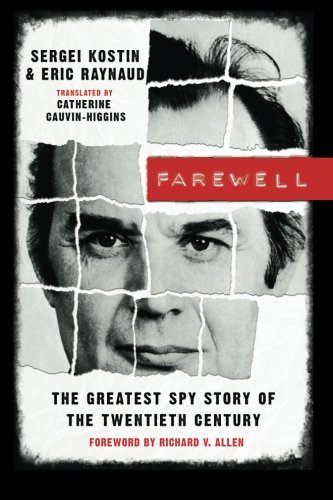Farewell: The Greatest Spy Story of the Twentieth Century / Sergei Kostin, Eric Raynaud
| List Price: | |
Our Price: $10.99 | |
|
For Bulk orders
| |
|
Used Book Price: $4.80 | |
| Farewell: The Greatest Spy Story of the Twentieth Century / Sergei Kostin, Eric Raynaud | |
| Publisher: AmazonCrossing | |
| Availability:Usually ships in 24 hours | |
| Sales Rank: 217630 | |
|

Question: You spent two years researching the backstory of this book. What about Vetrov first caught your attention?
Sergei Kostin: It was pure luck that I happened upon this case. I was writing a book with a former KGB colonel who was responsible for counterintelligence operations in the Soviet Union investigating French citizens. While we were working together, he mentioned the Farewell case. He had asked for the Farewell dossier in order to learn about the techniques used by French intelligence for handling Farewell in Moscow, so he studied a number of the files and took many notes. The notes he gave me from his research were the start of my investigation, because I realized how relevant this case was for the present day--and Farewell's complex personality was intriguing to me.
Q: There are many sides to this story: Russian, French, American. How did you begin unearthing all the pieces and evaluating how to share them?
SK: For the first year, I only had the Russian side. I had the notes from the Farewell KGB dossier, as well as notes from interviews with his widow, his son, his colleagues, and his friends. Then I went to France and had the chance to add the recollections of Farewell's first handler, Xavier Ameil, and his wife, Claude. I did try to get additional information from the DST (the French counterintelligence agency) and the DGSE (French foreign intelligence). As I expected, they didn't cooperate. The DST head during Farewell's time, Marcel Chalet, then retired, refused to meet me; his deputy, Raymond Nart, was still in active service. Patrick Ferrant, Farewell's main handler, also refused.
Luckily, I was contacted by Eric Raynaud, who wanted to make a movie of my book Bonjour, Farewell and was working on the script. We met two years later and I offered him the opportunity to collaborate on a new edition, giving him some leads in France. Thus it was Eric who conducted the main investigation from the French side for the second edition. There were several reasons for this: It was six years after my first try at uncovering more information, so Raymond Nart and Patrick Ferrant had retired and were able to reveal more. And on top of that, a Russian journalist researching a book about espionage looks suspicious. Because Eric was French and had plenty of time and flexibility, he was able to convince Marcel Chalet and Jacques Pr vost to speak about the case. Also he obtained comments about the Farewell cast from Richard Allen, President Reagan's first national security adviser. As a result of Eric's work, our book on Farewell's case became much more consistent from an international perspective.
Q: Because Vetrov is viewed as a traitor in Russia, you initially published your book in France rather than your home country. The Russian government forbade filming of the screenplay in Moscow, and two Russian actors bowed out of the lead role because of social and political pressure. Did you ever consider not publishing the book because of the social taboos?
SK: No. I wrote the first version of my book in 1995 to 1996, when many more doors, including those inside the KGB, were, if not open, at least not shut in your face. My first edition was an accurate reporting of facts, without any political allegations. What could they have objected to? For the second version, I contacted some people I couldn't get to before or of whose existence I had been unaware. I had a long interview with Vladimir Kryuchkov, the former head of the Soviet Union's Foreign Intelligence and later on of the whole KGB; Igor Prelin, former operative of internal counterintelligence dealing with Soviet intelligence officers; Valery Rechenski, who was Farewell's inmate in prison; and so on. All these people were much more at ease talking about the case the second time around because many of the officials involved had died, and because it looked more like pure history. My reason for not publishing my book in Russia was ultimately out of consideration for Farewell's family. His widow and son helped me a great deal in reconstructing his life, and I didn't want their acquaintances pointing and whispering about them after having read this book. In Russia, Farewell is not considered a hero, even if his work objectively helped bring about the end of the Communist regime.
Q: While conducting background research for his screenplay, Eric Raynaud uncovered new information that was used to expand the book. Is there one new detail he came across that you found particularly enlightening?
SK: Eric's information helped give the book a more consistent French point of view; forced me to modify some of my initial conclusions, which were probably too critical; and helped me to better see the international dimensions of the case. However, the information that was the most exciting to me was the relationship and conversations between Farewell and Patrick Ferrant. That was a huge contribution from Eric's side.
Q: In your opinion, what makes this account of Agent Farewell "the greatest spy story of the 20th century"? What will stick with readers?
SK: I'm convinced that Farewell's aims to destroy the KGB had a much greater impact than even he anticipated. The information he handed over to the West completely changed Western countries' view of the Soviet Union. They thought they could maintain a balance of power with the USSR through peaceful competition. But upon learning of the KGB's proficiency in stealing global technological secrets, they realized this wouldn't work. Whereas Carter and Nixon were partisans of d tente, President Reagan didn't see things the same way. He wanted to defeat Communism, and Farewell gave him one of the most important arguments for this stance. But more simply, on a human level, Farewell is a fascinating story of an ordinary man who found himself in the right place at the right time and became an actor in making history.
Click on thumbnails for larger images
 |  |  |
 |  |  |
Now you can buy Books online in USA,UK, India and more than 100 countries.
*Terms and Conditions apply
Disclaimer: All product data on this page belongs to
 .
.No guarantees are made as to accuracy of prices and information.










